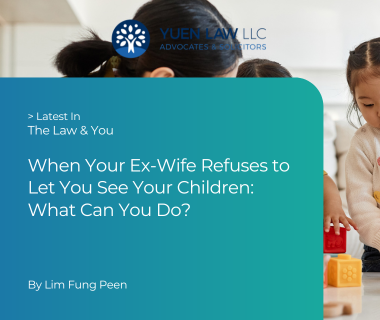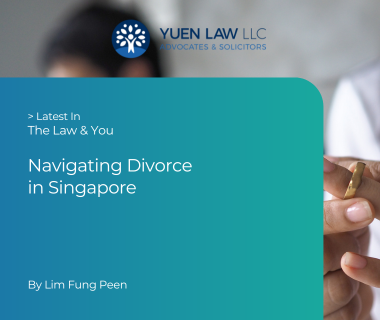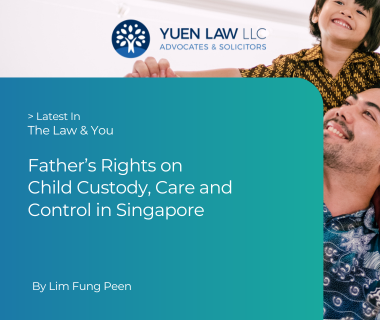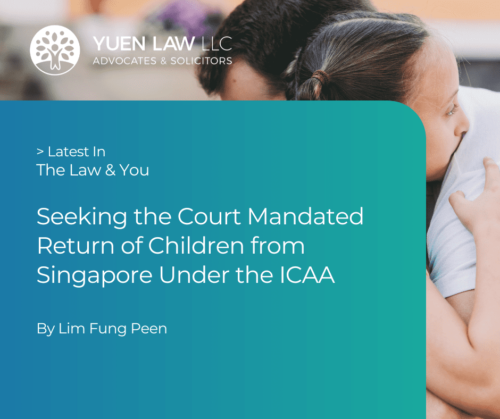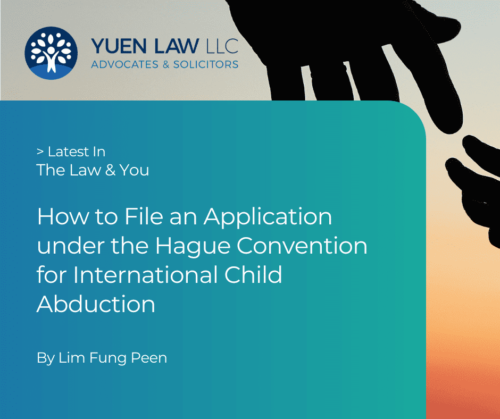This article will simplify the concepts of spousal maintenance and child maintenance, explaining who is responsible for payments, when they need to be paid, when these responsibilities end, and how the amounts are calculated.
Latest News! 📢
From 16 January 2025, the Courts have more powers now to do more to help ex-spouses and children do more get moneys due to them under maintenance orders.
What is Maintenance?
In Singapore, monetary payment for a child or spouse is known as maintenance, it maybe referred to by different names in other countries. For example:-
| Country | Commonly Used Term |
| Singapore, United Kingdom, or Hong Kong | Child Maintenance or Spousal Maintenance |
| United States, or Malaysia | Child Alimony or Spouse Alimony |
| Australia, Canada, or New Zealand | Child Support or Spousal Support |
Maintenance is payment of money to either a child or to a spouse for their living expenses, this includes reasonable medical and educational expenses. Maintenance is ordered by the Court on the application by a parent on behalf of a child or by spouse.
Under Singapore Family Law, both parents are responsible for their child’s maintenance, regardless of custody arrangements. The parent who does not have primary care of the child, often referred to as the non-custodial parent is responsible for making maintenance payments to the custodial parent.
How Is The Amount Of And Duration Maintenance Calculated?
Child Maintenance Calculation
Generally, the Court starts with the earning capacity of the paying party. In the case of child maintenance this means looking at each parent’s income and the Court will consider a fair apportionment of the shared burden.
Example:
If both parents earn similar income their responsibility could be 50-50, and if one earns more the percentage would be adjusted to be fair. Income will be assessed against what is the reasonable expenses of the child. A child with special or medical needs would incur higher expenses.
Other factors will be taken into e.g. who pays for household expenses etc and whether the expenses have been incurred before and other debts and liabilities. Courts are vigilant about inflated expenses as with any attempts to hide the truth about income.
Spousal Maintenance Calculation
For spousal maintenance, the additional factors the Court will consider is the length of the marriage, the income of the requesting spouse, the reasonable needs of the spouse, and the standard of living the claiming spouse is accustomed to.
Example:
If the marriage is shorter in duration, the maintenance amount is usually lower compared to a long marriage of 20 years or more.
The Court will consider other factors such a pre-nuptial agreements in deciding a fair amount and for how long.
The paying party is not expected to pay beyond:-
- Remarriage of the Recipient Spouse; and
- The expiry date of the maintenance order; and
- Upon the child turning 21 or becomes financially independent, or gets married.
How to Reduce Child and Spousal Maintenance?
The Court has the power to decrease or increase the amount if there is a material change in circumstance. Examples include:
- The receiving spouse becomes financially independent; or
- The paying spouse suffers a job loss or medical condition that reduces his earning capacity; or
- The child no longer requires financial support.
To succeed in persuading the Court to vary the amount, the applicant should have credible and relevant evidence.

When Can Maintenance Be Claimed?
The claim for maintenance is commonly made as part of divorce proceedings as part of Ancillary Matters. However, a standalone claim is often made before a divorce case starts – this is common where a child or spouse is in urgent need of funds for living such as unpaid school fees, rent, medical bills etc. The Court application for a standalone maintenance claim is known as a Maintenance Summons also known as (“MSS”).
Making A Maintenance Claim
The Singapore Family Court has intentionally made this as simple as possible so that a person could DIY and not appoint a lawyer. Part of the MSS process includes mediation and the Court facilitates a way for spouses to amicably settle the claims. If an agreement is reached, a Court Order for maintenance will be made. For example, the Court may order the Father to pay $X per month for child maintenance for Child 1 and Child 2, or the Husband to pay Wife $Y per month for spousal maintenance.
If no agreement is reached, the matter goes on the contested track and parties are expected to have a maintenance trial before a Judge. Many parties appoint lawyers at this stage to organize their supporting evidence, and also prepare Court documents to put their best case forward. This makes sense for many who reach this stage as the stakes are high to them, and they need a domain expert to guide them on the Rules of Court for evidence and procedure of a maintenance trial.
What Can Be Done If Ex-Spouse Fails to Pay Maintenance?
If reminders and requests have been made and there is no explanation or response, you can apply to Court for enforcement of the maintenance order. The Court has the power to do the following to facilitate payment.
Deduction from Salary (Garnishee/ Attachment of Debt)
If appropriate the Court has the power to order that a portion of the non-paying person’s salary be deducted directly from their salary to comply with the maintenance order.
Fine and/or Jail Term
The Courts now have power to impose on the defaulting ex-spouse may be fined and/or imprisoned for up to 1 month, for each month of maintenance owed. Even with a prison sentence, the outstanding maintenance amount will still have to be paid upon release. Such severe punishment is usually only imposed in cases where the ex-spouse has repeatedly defaulted and ignores Court Orders without good reason.

A New Maintenance Enforcement Process (“MEP”)
MEP will be implemented on 16 January 2025. In Phase 1, the new MEP will be available to those who have made one or more previous court applications to enforce payment owed to them under maintenance orders. The MEP will be available for other categories of enforcement applications in later phases.
The new MEP will:
- Deter non-payment of maintenance;
- Make enforcement easier when there is non-payment of maintenance;
- Facilitate sustainable maintenance outcomes; and
- Increase access to justice for applicants, especially those who are self-represented.
Under the new MEP, applications to enforce payments owed under a maintenance order will be referred to a newly established Maintenance Enforcement Division (“MED”) sited in the Ministry of Law.
Maintenance Enforcement Officers (“MEOs”) from the MED will facilitate amicable and sustainable settlement between parties. In conciliation, which replaces the existing mediation process, MEOs will play a more active role in seeking information and recommending solutions to the parties. The MEOs are also empowered to obtain information from the parties and, if necessary, banks and other third parties such as public agencies. This will ensure the resolution of the maintenance enforcement application is based on parties’ true financial circumstances.
The MEOs will then submit a report to the Family Justice Court (“FJC”). With the information provided by the MEOs, the FJC can more accurately determine the parties’ financial circumstances and distinguish between respondents who cannot pay maintenance and those who refuse to pay. This will help the FJC to make more targeted and effective enforcement orders to recover maintenance arrears.
The MEOs will also refer suitable parties to financial assistance.
Maintenance Enforcement Process Phase 1
During Phase 1, the MEP will apply to eligible repeat maintenance enforcement applications.
Applicants who wish to enforce a maintenance order can file their applications at the FJC. If this is the first maintenance enforcement application, the MEP will not apply during Phase 1. Instead, the FJC’s existing maintenance enforcement process will apply and you may wish to seek the help of a lawyer.
Frequently Asked Questions
Until what age is child maintenance required in Singapore?
Every parent has a duty to provide financial support for their child until the child reaches 21 years of age, becomes financially independent or gets married, whichever occurs first. A child maintenance order will cease to have any effect once the child turns 21 years of age, unless the maintenance order expressly states otherwise.
What is the average amount for child maintenance per month?
In Singapore, there is no standard formula for determining child maintenance. Instead, the Court assesses each case individually, considering factors such as the child’s needs, the standard of living the child is accustomed to, and the financial capabilities of both parents.
Is a wife entitled to maintenance or alimony if she earns more than husband?
No, it is a misconception that the Women’s Charter guarantees all women financial support from their former husbands. If a wife is self-sufficient or has a high salary, the Court is hesitant to award her maintenance.
What qualifies a spouse for maintenance or alimony?
Spousal maintenance is the legal obligation of one spouse to support the other financially after a divorce. However, the Court will only award maintenance if it deems that the spouse requires financial support.
The main goal is to prevent undue hardship, but maintenance is not intended to create lifelong dependency. The Court typically expects the dependent spouse to seek employment to meet their needs. Additionally, the Court has clarified that a husband is not expected to be a “general insurer of sorts” for his former wife.
How long does spousal maintenance or alimony last in Singapore?
The duration of alimony in Singapore is not fixed and depends on the specifics of each case. The Courts assess various factors, including:
- The length of the marriage;
- Financial contributions of each spouse;
- Their age and health; and
- Future earning potential.
Alimony obligations also ends if the recipient spouse remarries.
Is spousal maintenance or alimony compulsory in Singapore?
No, spousal maintenance or alimony is not automatically granted in every divorce. The Court evaluates the circumstances of each case, including whether the wife can maintain the standard of living she enjoyed during the marriage.
The Court does not aim to ensure that both parties remain in the same financial position they would have been if the marriage had continued. Courts have acknowledged that divorce often results in financial adjustments for both parties, typically leading to less money than during the marriage.


